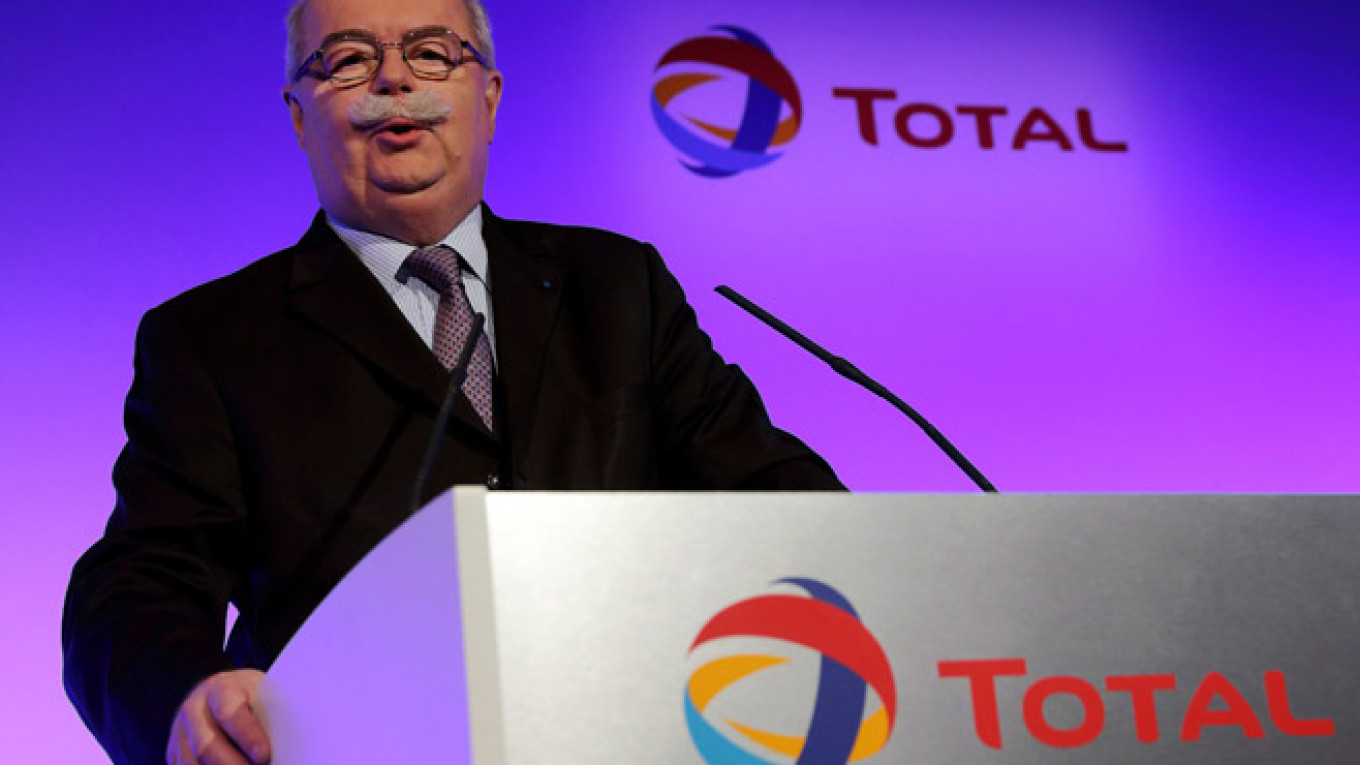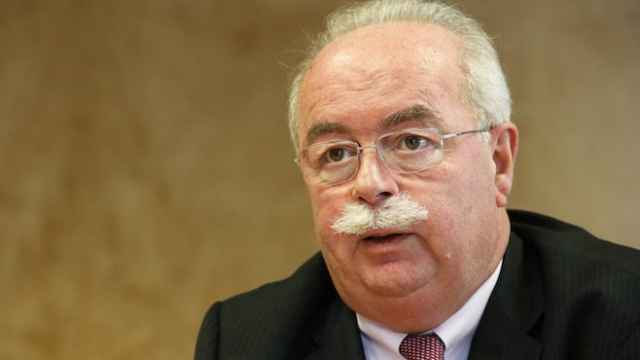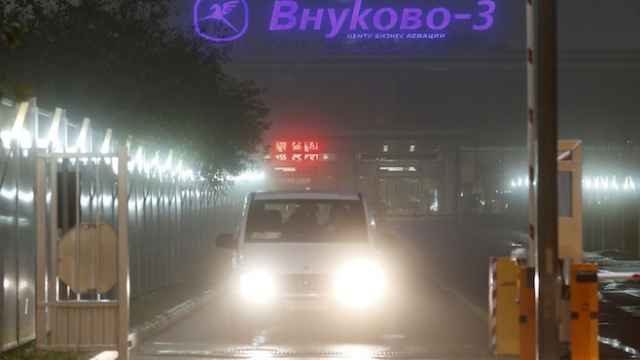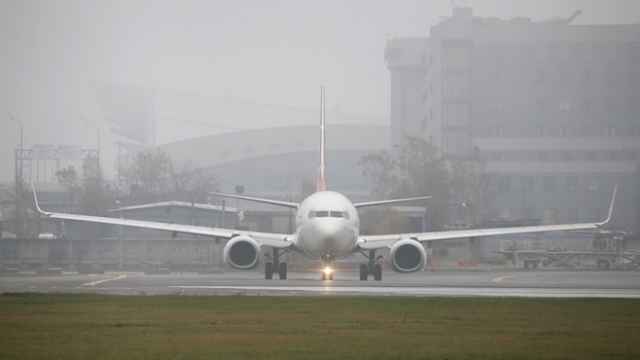Christophe de Margerie, CEO of French energy giant Total, was killed on the runway of Moscow's Vnukovo Airport on Monday night when his private airplane struck a snowplow.
The 63-year-old executive, who spearheaded a number of joint energy projects between France and Russia and advocated that the countries maintain strong business ties despite political disagreements, was on his way back to Paris after talks with Russian Prime Minister Dmitry Medvedev as part of the Foreign Investment Advisory Council, an annual meeting between the Russian government and the top foreign businesses active in Russia. Total is one of the world's six major oil companies, and the third largest in Europe.
Just before midnight, the CEO's private jet, a Falcon Dassault 50, collided with an airport snowplow during takeoff and burst into flames, killing De Margerie and the three French crew members on board, Vnukovo Airport said in a statement. The snowplow's driver, whom investigators named as Vladimir Martynenkov, was unharmed in the incident.
“It has already been established that the snowplow’s driver was in a state of alcoholic intoxication,” Investigative Committee spokesman Vladimir Markin said. Martynenkov's lawyer, Alexander Karabanov, denied the accusation, saying his client had chronic heart problems and did not drink, the Interfax news agency reported.
According to Russian media, dense fog had forced all three of Moscow's international airports to divert some flights on the night that De Margerie was killed, with 12 flights that were supposed to land at Vnukovo diverted to nearby Domodedovo Airport. Vnukovo, which was closed for 90 minutes overnight to clear the scene of the accident, said that visibility was 350 meters at the time of the collision.
This is not the first fatal accident to occur at Vnukovo, whose VIP terminal is regularly used by Russian and foreign officials and businesspeople. In December 2012, a Russian aircraft flying without passengers broke into pieces after skidding off the runaway and crashing into an adjacent highway, killing four of the eight crew members on board.
Russian-French Investigation
Russia's Investigative Committee said Tuesday that a criminal case had been launched into the incident. Violating aviation safety regulations can be punishable by up to seven years in prison under Russian law.
According to investigators, preliminary evidence suggests that human error on the part of the snowplow's driver or staff on the runway could have caused the accident.
Russia's Interstate Aviation Committee and the country's federal aviation agency, Rosaviatsia, are also probing the circumstances surrounding the accident.
France's authority for investigating civil aviation accidents said that three investigators would be sent to Moscow on Tuesday to assist their Russian counterparts. The aviation committee said the black boxes, which have been retrieved from the wreckage, would only be opened and examined in the presence of the French investigators.
A Friend of Russia
President Vladimir Putin sent a telegram offering his condolences to French President Francois Hollande on Tuesday, in which he said that De Margerie had been at the origin of joint projects that “laid the foundations for long-term fruitful cooperation between Russia and France in the energy sector.”
“We have lost a true friend of our country, but he will remain in our memories,” the telegram read, according to the Kremlin's official website.
De Margerie, who French Prime Minister Manuel Valls said had been a “great industry captain and patriot,” joined Total in 1974, before becoming the company's CEO in 2007 and taking on the additional role of chairman in 2010. Nicknamed “Big Mustache” for his bushy white whiskers, the oil executive — who also served as the co-president of the economic council of France's Chamber of Commerce and Industry — had advocated for his country to disassociate politics and business in its relations with Russia.
Putin's spokesman, Dmitry Peskov, said that the president had known De Margerie for a long time and that they had a “close working relationship,” state news agency TASS reported.
“The president greatly appreciated De Margerie's business skills, his continued commitment to the development of not only bilateral Russian-French relations but also on multifaceted levels,” Peskov said.
Business Above Politics
Throughout the Ukrainian crisis, French politicians and business leaders have argued that economic interests should prevail over politics in France's dealings with Russia. France has been pressured by other Western nations to walk out on its 1.2 billion euro ($1.5 billion) deal with Russia for the delivery of two Mistral-class helicopter carriers.
In September, Hollande said the delivery of the first ship could be suspended over Russia's alleged role in the fighting in eastern Ukraine. The French president later said that France would make a decision in late October, citing an observed cease-fire and a political settlement to the Ukraine conflict as conditions for the delivery of the Mistral ships.
De Margerie had told Hollande that he was concerned that France's approach to the Ukrainian crisis would compromise Total's business interests in Russia. The CEO had made Russia a priority country for Total, hoping that the country would be its biggest source of oil and natural gas by 2020.
In May, Total and LUKoil signed an agreement on the exploration of the Bazhenov shale oil field in western Siberia at the St. Petersburg International Economic Forum, an event that De Margerie said would have been a “mistake” to snub.
De Margerie's company, which employs about 100,000 people, has operated in Russia for more than two decades. Last year, Total produced 207,000 barrels of oil equivalent per day in the country, according to the company's website. The company is also in a $27 billion joint venture with Novatek, Russia's largest independent natural gas producer, to extract gas in the Arctic Yamal Peninsula.
Contact the author at g.tetraultfarber@imedia.ru
A Message from The Moscow Times:
Dear readers,
We are facing unprecedented challenges. Russia's Prosecutor General's Office has designated The Moscow Times as an "undesirable" organization, criminalizing our work and putting our staff at risk of prosecution. This follows our earlier unjust labeling as a "foreign agent."
These actions are direct attempts to silence independent journalism in Russia. The authorities claim our work "discredits the decisions of the Russian leadership." We see things differently: we strive to provide accurate, unbiased reporting on Russia.
We, the journalists of The Moscow Times, refuse to be silenced. But to continue our work, we need your help.
Your support, no matter how small, makes a world of difference. If you can, please support us monthly starting from just $2. It's quick to set up, and every contribution makes a significant impact.
By supporting The Moscow Times, you're defending open, independent journalism in the face of repression. Thank you for standing with us.
Remind me later.






